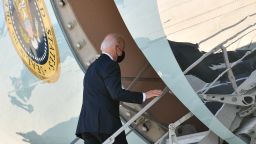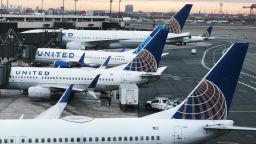Airline passengers walk to their flights in the airport terminal in Denver, Colorado, on Tuesday, April 19.
(Patrick T. Fallon/AFP/Getty Images)
At least for now, and maybe forever, US travelers will not be required to wear masks on airplanes thanks to a?court ruling Monday?that said the Biden administration’s Covid-19 transportation policy was unlawful.
The ruling, issued by the Tampa-based US District Judge Kathryn Kimball Mizelle, impacted not only air travel, but other modes of transportation, including trains and some public buses and metro rail. In the immediate aftermath, it injected confusion and uncertainty into travel requirements.
The Justice Department said Tuesday it will appeal the ruling if the US Centers for Disease Control and Prevention determines the mandate is still necessary to protect public health.
Here’s what to know about the ruling and what happens next:
Why did the judge strike down the mandate? Mizelle, who was appointed by former President Trump, had two main reasons for invalidating the regulation, which was rolled out by the CDC in early 2021. She said that the agency exceeded the authority given to it by Congress, and that – in how it rolled out the mandate – that it violated an administrative law that dictates the process executive branch agencies must go through in policy-making.
On the latter point, Mizelle’s ruling was one of several rulings where the administrative law, the Administrative Procedure Act, has been?used to block executive branch policies?of administrations of both parties. Biden initiatives on immigration have also been struck down for violating the APA, as have Trump era immigration policies. The law was also cited in striking down Trump-era changes to the 2020 Census, for instance.
Mizelle said that the mask mandate violated the APA because the administration didn’t have an adequate excuse for forgoing public notice and comment on the rule, and because the CDC did not offer enough of an explanation for why it was implementing the requirement.
Her ruling on the CDC’s statutory authority dug into the meaning of the word “sanitation” in the relevant section of the 1944 law giving the executive branch the authority to issue regulations that address communicable diseases.
The practical applications of the ruling: Hours after the ruling came down, the Transportation Security Administration (TSA) – which was tasked with carrying out CDC’s rule in airports and in other contexts – said it was no longer enforcing the directive because of the ruling. That put the ball in the court of the airlines, who could have chosen to keep the mask mandates in place on their planes. But so far, every major airline that has weighed in on what they’d do going forward has said that masking is now optional for passengers and flight crew on domestic flights.
But it’s worth noting that the CDC’s mandate applied to far more than just air travel. And the picture has been more patchwork for the modes of ground transportation where the requirement had also been in effect. Some local jurisdictions, like New York and Chicago, said that they would be keeping the mask mandate in place for public buses and subways. Other localities, including DC and Minneapolis, lifted the requirement for their public transportation methods. Amtrak also dropped the requirement.
If the ruling is appealed and overturned by a higher court, then the Biden administration would have the ability to reinstate it. Notably, before Mizelle’s ruling, the mandate had only been extended through May 3 and the administration was still considering whether to extend it further.
President Biden, asked by reporters Tuesday if people should still wear masks on planes, said, “That’s up to them.”
The legal ramifications: If the judge had just struck down the the policy on APA grounds, the administration could theoretically take another stab at the policy and roll it out in a way that cured the procedural defects identified by the judge. But her ruling on the CDC’s authority hamstrings the administration’s ability to revive the mandate in a way that goes beyond just fixing the procedural issues with the requirement.
Her ruling said that any regulation aimed at “keeping things clean” – instead of at actively cleaning something – would be out of bounds of the relevant provision of current law. Only a higher court could overturn or narrow her ruling as it pertains to the CDC’s mask mandate
As a district judge, however, her ruling does not carry precedential weight. That means other courts across the country would not be obligated to follow her reasoning in how they handled future lawsuits challenging similar types of regulations.
If the 11th Circuit – which oversees appellate challenges from Florida – upheld her ruling, it would be precedent for all the other federal courts in that circuit, which covers the Southeast. A Supreme Court ruling upholding her conclusions about CDC’s authority would make them binding nationwide.
What happens next? The Justice Department on Tuesday made a potential appeal contingent on a CDC review.
“The Department of Justice and the Centers for Disease Control and Prevention disagree with the district court’s decision and will appeal, subject to CDC’s conclusion that the order remains necessary for public health,” spokesperson Anthony Coley said in a statement.
“The Department continues to believe that the order requiring masking in the transportation corridor is a valid exercise of the authority Congress has given CDC to protect the public health. That is an important authority the Department will continue to work to preserve,” Coley said.
The CDC was set to assess whether the mandate was still needed until May 3, and Coley said any appeal would come after that date.
“If CDC concludes that a mandatory order remains necessary for the public’s health after that assessment, the Department of Justice will appeal the district court’s decision,” Coley said.
If an appeal happens, it would be a risky move that could limit the government’s ability to make similar mandates in the future. If the 11th Circuit – which oversees appellate challenges from Florida – upholds the ruling striking down the mandate, it would be precedent for all the other federal courts in that circuit, which covers the Southeast. A Supreme Court ruling upholding the decision to strike down the mandate would make the judge’s conclusions about CDC authority binding nationwide.
Read more about the ruling here.














